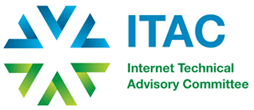The 65th session of the Information, Computer and Communications Policy committee (ICCP) was held on 11-12 April at the OECD headquarters in Paris.
The Internet Technical Advisory Committee (ITAC) provided concrete proposals for the future activities of the ICCP and its high level events in upcoming years, in particular stressing on the importance to assess the positive impact of open Internet standards on global innovation. In this regard, the OpenStand Paradigm was highlighted as providing key principles that encourage the development of market driven and efficient standards that are global, interoperable and open.
One of the key issues discussed at the ICCP was about the deployment of IPv6 and the importance for OECD member states to further promote its adoption. Marco Hogewoning (RIPE NCC) presented the main findings of a draft paper authored by Geoff Huston (APNIC) on the transition from IPv4 to IPv6. It was preceded by video interventions from Geoff Huston and Vint Cerf highlighting the key challenges and importance to foster IPv6 adoption to ensure a sustainable Internet economy.
- Geoff Huston’s presentation: http://www.potaroo.net/presentations/movies/IPv6-OECD.mp4
The OECD also held a session taking stock of the ITU WCIT conference and inviting guidance on how best to address Internet governance challenges in years to come. ITAC, represented by Nigel Hickson (ICANN), stressed the importance to engage with developing countries and to share best practices in other to address some of the concerns that emerged in Dubai. Ultimately, it is hoped that further exchanges and shared understanding will also lead to greater appreciation of the value of multistakeholder frameworks for Internet policy making.
Earlier in the week, ITAC was invited by the OECD Working Party on Security and Privacy to lead the organisation of a roundtable on developments in Cryptography Policy. Robin Wilton (ISOC), Gershon Janssen (OASIS) and Michael Donohue from the OECD Secretariat, with the help of BIAC, CSISAC and OECD members, pulled together a very good set of speakers, who were able to provide both a technical context and topical examples of the economic and social impact of cryptography policy.
Robin Wilton (ISOC), who moderated the roundtable, remarked in conclusion:
- economic and social activity depend on sound cryptography policies
- governments and business need to pay attention to the evolution of cryptography technologies
- even the most careful deployment of cryptography can be flawed, can suffer from attack
- cryptography works best when mechanisms are hidden from the user, because the less the user has to do, the more likely they are to use it.
